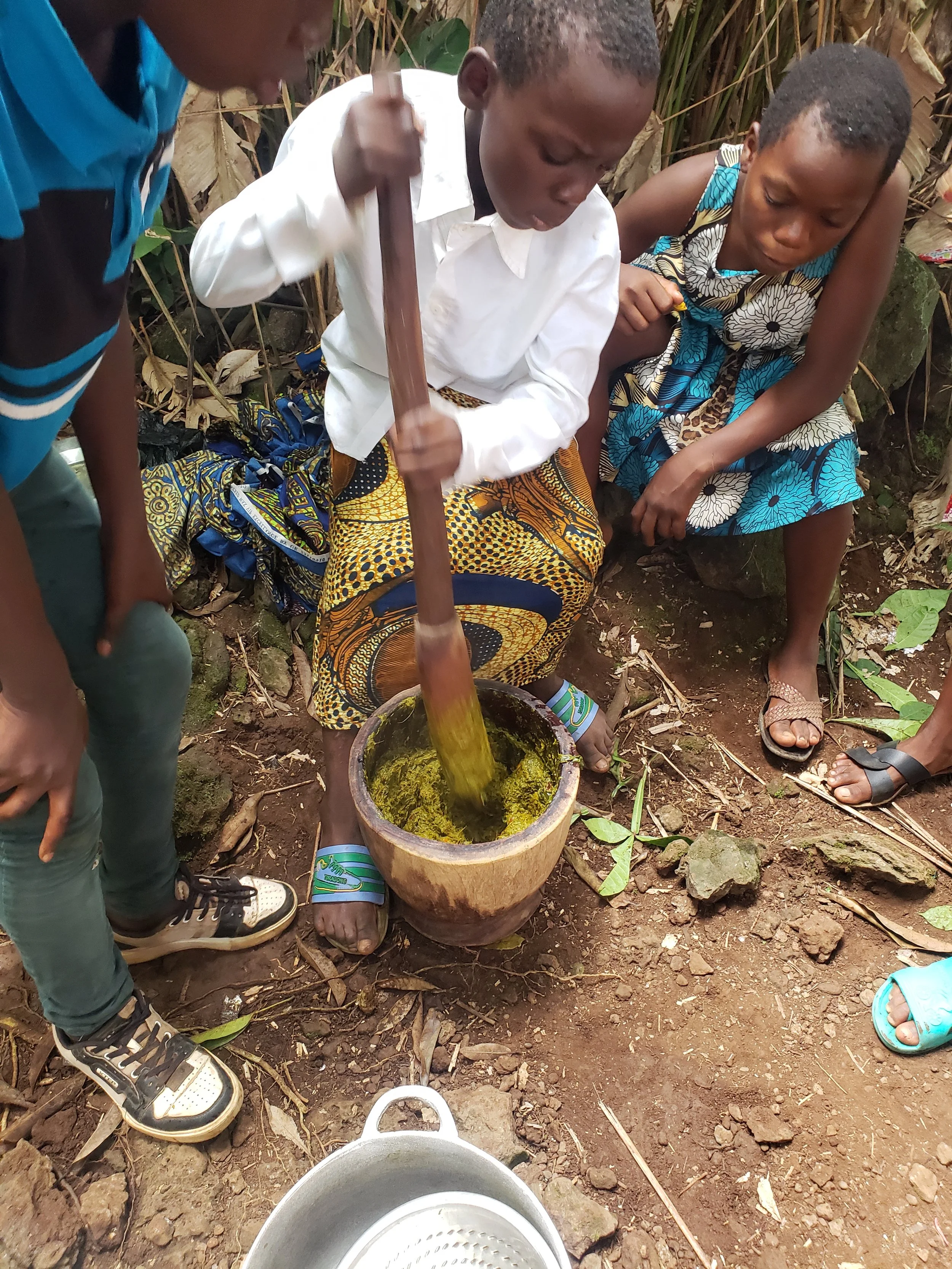CAMEROON
The slopes of Mount Cameroon, with Pico Basile, Equatorial Guinea in the background. (Photo: S.A. Laird)
Mount Cameroon is an active volcano, the largest mountain in West Africa, and one of the most biologically diverse places on earth. The indigenous Bakweri and other groups living around Mount Cameroon and in Southwest Province retain strong traditional resource management systems that grow from deep historical and cultural connections to place. However, biodiversity, forests and traditional knowledge and practices are under pressure from industrial agriculture, oil, and other global economic and cultural forces.
The Mount Cameroon Traditional Foodways Program is working to shore up and conserve threatened traditional food systems, including the management, harvesting, cultivation, and preparation of traditional foods. Our work grows from many years of collaboration with Bakweri and migrant villages, local NGOs and institutions around Mount Cameroon.
The Traditional Foodways Program has documented traditional management practices in the Mount Cameroon area for more than 30 years. Our work today is focused on knowledge exchange and education, including manuals, video and posters. For more information on the full range of work around Mount Cameroon, please visit Mount Cameroon Cultural Landscapes Program.
Our Work
Manuals, videos and posters serve as the basis for interactive education and outreach programs in schools and villages. Manuals include drawings by local artists; myths and stories from older members of the community; current and historical uses of species; ecology and management; and the importance of species in local livelihoods and traditions.
Education programs include bringing elders and young people together to harvest and cook foods no longer widely consumed (for example, a wider range of greens, mushrooms, yams, and forest fruits), to collect and process medicinal plants, and gather materials from the forest to make baskets, musical instruments and pieces for games.
To create an atmosphere of celebration, and support complementary and overlapping forms of traditional knowledge that are also disappearing, games, dance, and music are included in this program, as are home gardens, the source of many foods, and plants used as both food and medicine. Exhibits and events in local towns celebrate traditional foods and the people who harvest, grow and cook them, and the forests and biodiversity on which they depend.
Wrapper leaves of Mount Cameroon
People and Plants has produced a video on wrapper leaves used for cooking traditional Bakweri and other foods around Mount Cameroon. Wrapper leaves are used around the world in traditional foodways. The video follows wrapper leaf harvesters in the forest, as they process the leaves, bring them to market, and use the leaves to prepare foods.
Recipe Videos
A series of recipe videos are part of an on-going education program highlighting the links between food, culture and place, and threats to important food species and forests. The videos include Martha Dialle preparing ngonyawembe, and Emilia and Cecilia Ndive preparing kwakoko and mbanga soup in Likombe village. In Limbe, Sophie Eposi prepares kwakoko bible, and Immaculate Sambit prepares fufu corn, njamajama and fish.
Education
In partnership with the Wildflower Foundation, Forests Resources and People (FOREP) and the Limbe Botanic Garden (LBG), training and education programs are held in local schools and the Limbe Botanic Garden, and include:
Interpretive materials on traditional foodways and useful plants in the Limbe Botanic Garden, focused on medicinal, spice and food species.
Training guides to make information more accessible and interesting to visitors, including the uses and cultural values of plants.
Education programs for children from the town of Limbe, including Saturday programs in the Limbe Botanic Garden focused on ecosystem and biodiversity conservation, and traditional foodways. Field trips from schools include preparation of traditional dishes from the Bakweri, Ngolo and Eyang tribes, and exploring traditional food species in the botanic garden.
Traditional Foodways Education programs in the Limbe Botanic Garden. (Photos: C. Fominyam)
Traditonal Foodways workshop at the Limbe Botanic Garden.
Ndive Cecilia in her kitchen. Likombe village, Mount Cameroon. (Photo: S.A. Laird)
Emilia Ndive in her farm on Mount Cameroon. (Photo: S.A. Laird)
Likombe Village, Mount Cameroon. (Photo: S.A. Laird)
Hunter with dogs on Mount Cameroon. (Photo: S.A. Laird)
The Team
Elias Ndive, Emilia Ndive, Cecilia Ndive, Sophie Eposi, Ndumbe Paul, Stella Asaha, Annette Dingha, Claudette Dingha, Sarah Laird, Stephanie Ewi Lamma, Christopher Fominyam Njoh, Rita Lysinge, and Immaculate Sambit.
Partners
The Charles Engelhard Foundation, The Melza M. and Frank Theodore Barr Foundation









